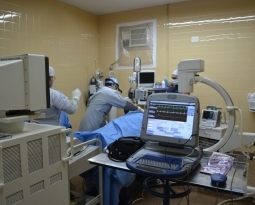Hawaii Patent of the Month – April 2024
Innovation in material processing has taken a significant leap forward with Oceanit Laboratories, Inc‘s new method for automated material processing. Imagine a system that seamlessly extracts samples from a process stream, scans them using various energy sources, and employs artificial intelligence to analyze and sort the materials in real-time. This is the future of material processing, revolutionizing industries like mining, oil and gas, and materials synthesis.
At the core of Oceanit’s invention is a method that combines cutting-edge technology with practical application. By utilizing energy sources such as visible light, infrared light, radio-frequency (RF) energy, and more, the system scans samples extracted from the process stream. These samples may include unique RFID tags, each containing RF metamaterials that produce distinct spectral features when exposed to microwave radiation.
Oceanit’s method harnesses the power of artificial intelligence to analyze scanned sample data and identify and sort materials within the process stream. Machine learning, machine vision, and anthronoetic AI are just some of the AI methods employed, implemented on both hardware and software platforms. This allows for real-time analysis and instant feedback, providing users with invaluable insights into their material processing operations.
One of the key advantages of Oceanit’s invention is its versatility. Whether the process stream comprises fragmented solids or mixed-phase solid-liquid streams, the system can adapt and deliver accurate results. It can even remove solids from mixed-phase streams, further enhancing its efficiency and utility.
Oceanit’s method enables operational responses based on analyzed sample data, optimizing material processing in-line. Algorithms can be applied to streamline operations and maximize efficiency, all while minimizing waste and variability.
The application of Oceanit’s invention extends beyond mere material processing. In industries like mining, it allows for precise tracking of ore from extraction to processing, optimizing blending and refining processes. Real-time data on ore characteristics enhances planning and operations, ultimately improving productivity and profitability.
Oceanit’s method also introduces novel RFID tags that are chip-free and blast-tolerant, encased in robust packages for durability in harsh environments. These tags enable seamless tracking of materials, providing valuable insights into extraction timing and location within mines.
Oceanit’s invention represents a paradigm shift in material processing. By combining advanced technology with practical application, it offers a solution that’s not only efficient and effective but also adaptable to various industries and operational contexts. With its real-time analysis and operational optimization capabilities, it sets a new standard for material processing in the modern era.
Are you developing new technology for an existing application? Did you know your development work could be eligible for the R&D Tax Credit and you can receive up to 14% back on your expenses? Even if your development isn’t successful your work may still qualify for R&D credits (i.e. you don’t need to have a patent to qualify). To find out more, please contact a Swanson Reed R&D Specialist today or check out our free online eligibility test.
Who We Are:
Swanson Reed is one of the U.S.’ largest Specialist R&D tax advisory firms. We manage all facets of the R&D tax credit program, from claim preparation and audit compliance to claim disputes.
Swanson Reed regularly hosts free webinars and provides free IRS CE and CPE credits for CPAs. For more information please visit us at www.swansonreed.com/webinars or contact your usual Swanson Reed representative.

















